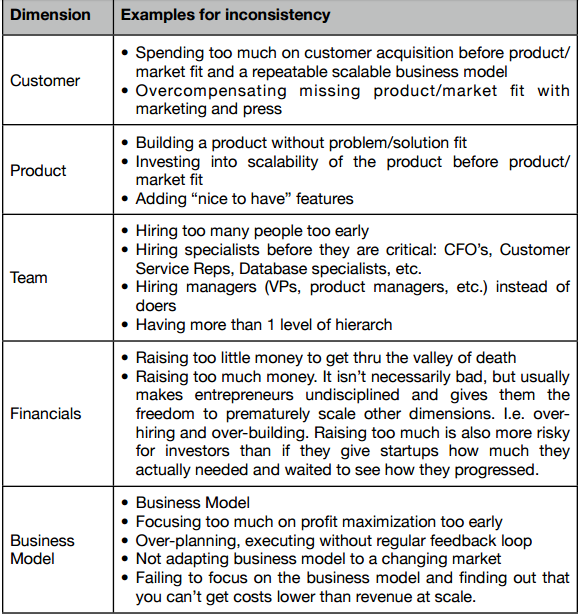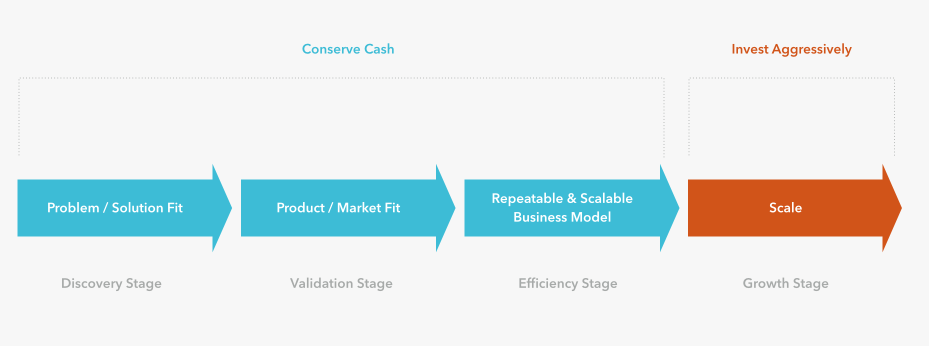Premature scaling means scaling your team, customer acquisition strategies or over building the product without getting to product/market fit first.
Startup Genome in a report published in 2011 identified premature scaling as the number one cause of startup failure.
The report states that most start-ups scale by keeping the 5 core dimensions of a start-up Customer, Product, Team, Business Model and Financials in balance and they need to master the chaos of getting each of these 5 dimensions to move in time and in tune with others. Based on StartupGenome’s analysis of about 3200 high growth internet startups approximately 70% of the startups in their data set scaled prematurely along some dimension and died as a result.
The startups in their data set were divided into 2 categories: Consistent and Inconsistent. Consistent startups were those who kept the customer dimension, the primary indicator of progress in a startup, in tune with product, team, financials and business model while inconsistent startups had one or more of these dimensions far ahead or far behind the customer dimension. Here are examples of inconsistency across all dimensions:

With the ideas of Premature Scaling, Consistent and Inconsistent Start-ups clear in our mind let us proceed to understand why start-ups prematurely scale and how as a start-up founder you can avoid falling into this trap.
Reasons why start-ups scale prematurely and how it can be avoided:
- One of the first reactions for most start-ups after raising a funding or closing a big customer (in case of B2B) is hiring more people. Founders also try to justify raising a round by hiring more specialists in their start-ups. This leads to hiring of too many people too early. The solution is to hire only if there is a serious need and making sure each new hire raises the bar for future hires.
- Most VCs look down upon so called ‘lifestyle businesses’. The easiest way to signal your intent to conquer the world is by splashing your newly raised money. Resist the urge to raise money till you reach product market fit.
- Most start-ups raise a new round and agree on a bunch of metrics to be hit in the next 18 months. Growth is the only thing which matters in today’s hyper competitive funding environment and one needs to grow fast or face the prospect of the much dreaded down round (few months down the line). To drive this growth founders try to throw more MBA folks at it. More people (especially having one more level of hierarchy) does not mean more output.
- It is easy to fake growth as well as traction nowadays. I had written earlier about how most start-ups today are chasing vanity metrics. For them growth means pumping money on acquisition channels. In case you are not focusing on retention and reducing churn you will lost 80% of your users in the first few weeks.
- Founders equate start-up culture with fancy offices and employee perks. Culture is much more than that. Bhavin Turakhia wrote a post on how one can think beyond TT tables to create a culture of mutual respect and a place where employees can give their 100% every day.
- PR stories do not equate success. It is hard not to think of yourself as the next big thing when you have the attention of the press (and paid PR posts never hurt). Losing focus will lead you to chase the next shiny product feature, hire (which will get you more press) and you will stop caring about the only dimension which matters the most — your own customers.
- Too many product features do not breed customer loyalty. But that is what most start-ups seem to be doing — mindlessly adding new shiny features. Coupons/discounts will help you increase your GMV (another vanity metric) but do nothing to improve retention. Ruthless prioritisation is the key here. Focus on the problem you were trying to solve with your product. Talk to your customers. Figure out the main causes for churn and fix them.

No comments:
Post a Comment